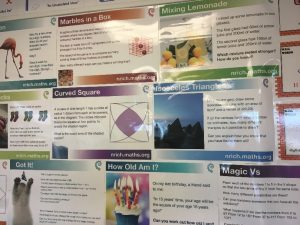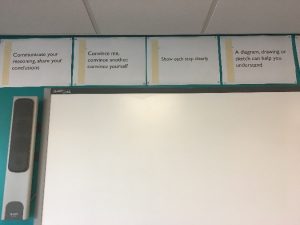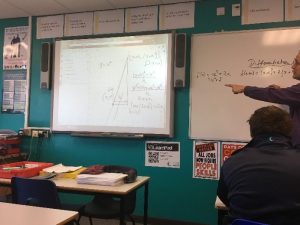Written by OU tutor Nick Constantine.

I have been teaching for about 30 years, so it had to happen sooner or later. ‘You taught my Dad’, said the young man a couple of years ago. I looked at him and enquired about his Dad’s name. I could remember him ‘phew’ and then a few days later he came back to me and said, ‘you were his best teacher’ ‘phew’, I thought again. It made me think, was I a good teacher or was I a good mathematics teacher? You might think I am playing with these terms, but I think there is a point here; you can be a popular teacher, learners like you but you may not be an effective teacher of the subject.
After this long in education I can afford to be a little daring with my views but also share some reflections on the ideas of the modules I teach on, namely Mathematical Thinking in Schools (ME620), Developing Algebraic Thinking (ME625) and Developing Geometric Thinking (ME627).
In my experience mathematics is a wonderful subject to teach. You can pepper the whole lesson with spontaneous discoveries, share the learning and encounter surprise, but only if you allow this to happen with a deep awareness of the task choice, how it will be introduced, the tools used and choices that learners can share. Ahmed (1987), found in Open University module ME620, talks about rich mathematical tasks: the sense that learners have a lot of choices when engaged in a task and not simply ‘this is the way’, ‘my way or no way’. Choices allow a sense of empowerment and ownership and the best tasks have this built in.

My classroom is covered with investigations and ideas for learners to look at and question. These posters are from https://nrich.maths.org/.
By allowing and encouraging learners to explore, question and conjecture you are building resilience. Good teachers explain and support, encourage and allow learners to accept the fact that a journey of discovery will result in wrong paths and dead ends. Why would you not want to foster resilience, an acceptance that to explore anything will result in obstacles and difficulties to overcome?
There are some other key ideas that have been introduced in the mathematics education modules that I find myself using a lot.
I want my learners to feel confident they can share what they sense and feel. In what ever form. They can draw it, explain it, share it or even wave their hands in the air! Conjecturing in the mathematics classroom needs to be encouraged and discussed, or in line with the mathematics education modules, getting learners to convince another person of their conjecture is an excellent way of encouraging and developing precise mathematical language. If teachers respond ‘nice idea John, but it is wrong’ then the principle of sharing any ideas will be diminished in the classroom. Sharing and discussing conjectures, observations and relationships is about developing a talking classroom. As learners are exposed to this their ability to be more precise with reasoning improves but only if guided by a skilled teacher.

Above my whiteboard are pointers to ensure mathematical thinking is always central to the lesson for example ‘convince me, convince another, convince your friends’ or ‘ a diagram, drawing or sketch can help you understand’.
The second experience I want my learners to meet is that how we imagine things is not fixed. Imagining and expressing is a key power in the mathematics education modules. How you imagine and what you imagine may be difficult to express initially. Teachers need to encourage and ask learners about what they imagine and try to get them to express this in a range of ways. However, perception is not the reality, it is A reality. How I perceive or sense something is how my mind internalizes the experience. This strongly relates to the cultural perspective and a full range of experiences (social and cultural) but it is worth stressing that if a teacher does not expose learners to using and developing their imagination, and how they express it, they lose a wonderful opportunity to gain some insight into the learner’s mind.
Linked to this key power, for me, is an often poorly used idea from many students studying our modules. Namely see, experience and master. In a Mathematics lesson, you show something, anything, and learners will only see certain features and rapidly interpret some form of understanding. The purpose of the teacher is to construct the learners’ experiences in a careful manner, perhaps using a range of techniques and tools. By doing this learners are encouraged to connect and develop relationships. By allowing learners a deeper experience of the richness of any topic, there is a greater chance they become more confident and indeed feel they have mastered the concepts.

A range of tools can help learners see and experience the topic in diverse ways.
Finally, another story to share, in my early years as a new teacher I was teaching a class and I noticed a student looking out of the window. I asked him to ‘get on with his work’. He looked at me and just said ‘I am thinking’. Be careful that absence of evidence is not interpreted as evidence of absence. Teachers, and not entirely their fault, have been driven to distraction about written feedback for learners. I understand, it is useful but if a learner can explain me to what they have learnt, write down some form of summary and share with others their learning this is a vastly more powerful learning experience for the learner.
